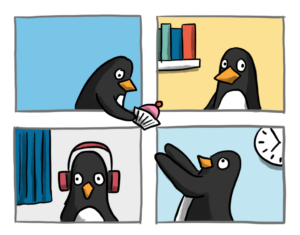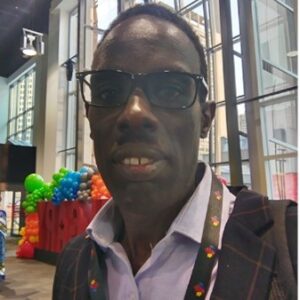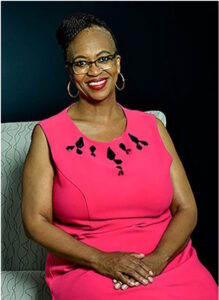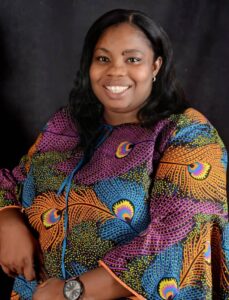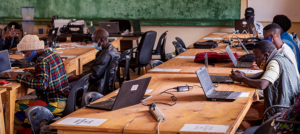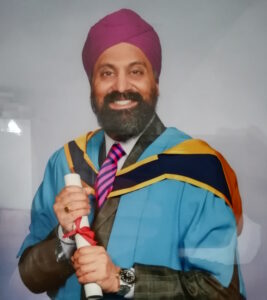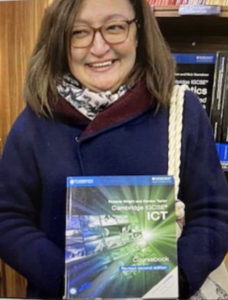H890 Research and Scholarship in Digital Education Conference 2025 – a summary
Dr Simon Ball, H890 Conference Organiser and Associate Lecturer, IET
Background
The second H890 Research and Scholarship in Digital Education Online Conference took place on April 11th and 12th 2025, as part of the Open University module ‘H890: Research And Scholarship In Digital Education’. This module is a postgraduate, 60-credit module that forms part of the Masters in Online Teaching. Each year the module students work on a scholarship project or design a larger research project, on a Digital Education theme of their own choice and relevant to their own professional context. They then present progress and findings at the online conference, which is open to the general public and to which all students of IET’s modules and micro-credentials are invited, along with OU staff.
Keynote Presentations
We were delighted that Professor Neil Selwyn of Monash University in Australia (currently seconded to Lund University in Sweden and actually speaking to us from Norway) agreed to deliver our opening keynote address. He reflected on ‘Ten things I’ve learnt about researching digital education’ (we received several bonus ‘things’ as there were about 14 in all!). There was so much food for thought I can’t cover here all of the points he made, but Neil guided our students to ensure they focus on the ‘state of the actual’ rather than future-gazing on ‘state of the art’; to evaluate technology objectively and not fall into the trap of trying to prove it’s a good thing; and to reflect on the people outside of the activity under focus rather than focussing only on those who have stepped forward to become involved.
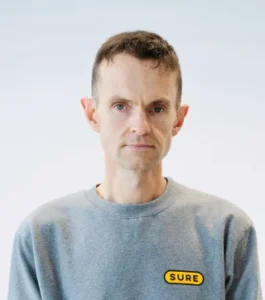
Professor Neil Selwyn
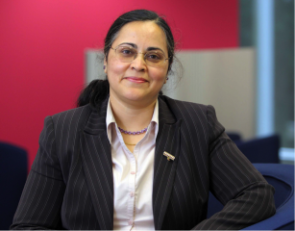
Professor Shailey Minocha
Professor Shailey Minocha, Emeritus Professor of The Open University, UK, kindly delivered our Day 2 keynote and once more we found ourselves filled up with insights and guidance on ‘Planning and conducting impactful scholarship’. Shailey elaborated on the importance of effective stakeholder analysis in digital education research, working out who will participate, who will advise, who are the communicators, who are the obstructors – fitting in nicely with Neil’s point about reflecting on those ‘outside’ the immediate focus as well as those within. Shailey also advised us to plan for impact from the outset. The possible impact of a digital education research project should be intrinsic to its design. She suggested the Theory Of Change framework as a possible route to fully consider all stakeholders and possible impacts. Shailey’s final point was about Evaluative Thinking, which requires empathetic curiosity, perspective-taking, belief in the value of evidence, creativity in the choice of research methods, being critically reflective and reflective, and making research-informed decisions.
Student presentations
Following Professor Selwyn and Professor Minocha’s thought-provoking and stimulating keynote presentations, it was the turn of our students to make their presentations. Nerves were high, but every one of them did themselves proud with excellent presentations of some very interesting research and scholarship projects.
Kirsty Masterton: Phonetically decodable e-books – impact on early reading practices and progress.
Kirsty took the first student slot with a confident and fascinating study on the use of e-books to support phonetic decoding in children. Taking a quasi-experimental approach, Kirsty collected data on the mean assessment scores of youngsters using e-books and those using print books to develop their reading skills via phonics. She then conducted parent surveys to find out more about the contexts the children were learning in. Towards the end of her presentation she polled the audience, asking whether they thought the use of e-books in place of print books would lead to higher, lower, or unchanged decoding (reading) scores among the children. The results were pretty even across the three possible options, before Kirsty revealed that her hypothesis was that the use of e-books would lead to less parental input and therefore lower scores. Only further research will reveal the true situation!
Phillip Newton: The Human Argument: Finding a space for teachers voices in the design of learning platforms
Phillip described research on the way learning analytics are utilised and the voice of educators in that process. His research focuses on three questions: Which type of learning analytics are most important to teachers? How do teachers act upon learning analytic data? How can the design of courseware and learning analytics dashboards support teachers’ classroom approaches? Gathering data from educators in a variety of means including digital diaries, Phillip plans to utilise Theory of Change to produce meaningful and impactful findings.
Demelza Hayer: Breaking in: Early findings from an Open University Associate Lecturer’s action research scholarship project critiquing own breakout room practices
After the break we heard from Demelza, who is conducting scholarship on the use of breakout rooms in synchronous online sessions in nursing degree courses. Using an Action Research approach, Demelza is investigating how breakout rooms are currently used in these courses and how their use can be made more effective. She is currently delving through hours of tutorial recordings to try to codify common practices and themes.
Billy Smith: How can A.I. patients effectively develop pharmacy students’ consultation skills?
Billy continued the student presentations with his research on consultation skills training for pharmacy students. Traditionally exercises and assessments are undertaken with human actors playing the role of patients. In non-assessed activities these are often other students or faculty, taking up valuable time and giving the ‘patients’ a degree of subject expertise that makes the situation unrealistic. Assessed skills exercises often employ professional actors, which is expensive, inflexible (students must attend on the day the actor is hired) and can lead to inconsistent experiences as actors try to relieve their boredom at repeating the same scenario over and over by making small changes to their responses. New 3D models with AI technology can potentially replace the flawed models of human ‘patients’ with responsive digital patients. Billy’s research is looking into the educator perceptions of this technology, and how effective the AI ‘patients’ are at developing the pharmacy students’ skills in comparison with the traditional techniques.
Amy Johnstone: Virtually There: Student experiences of remote and blended museum studies work placements
Amy wrapped up day one of the conference with her work on placements in the museum sector and the role of blended or remote elements to these. Prior to the pandemic, placements were almost always done in person at a museum or remated venue. Almost all such activity was shifted online during periods of lockdown, and since then a hybrid model has developed, with potentially different outcomes for students experiencing additional equity barriers (race, language, cultural, disability, socioeconomic etc). Amy is looking into the barriers and opportunities for professional development for equity-deserving students undertaking remote and hybrid work placements as part of postgraduate professional education in Museum Studies. Amy is using digital storytelling methods to expose the experiences of students before she conducts a thematic analysis on her findings.
Bina Radia-Bond: Diminishing Distance: Fostering belonging by mature HE students as Communities of Inquiry
Following Professor Minocha’s keynote that opened day two of the conference, Bina spoke to us about communities of inquiry, and what they can tell us about mature students’ sense of belonging. Looking at the use of discussion forums, Bina is researching how the students form a sense of community – the second phase of her research will involve interviewing students directly about their experiences. She hopes that her study will reveal findings related to the importance of tutor presence in discussion forums, expressions of emotionality, construction and reconstruction of knowledge via peer discussion, and the benefits and limitations of the text-based medium.
Tracey Aytoun: Striving for Success: Exploring Participation, Feedback and achievement within Sunderland Online Undergraduate Nursing Students
Tracey delivered her presentation from the nursing training discipline, and with particular focus on the value of online discussion for students, a large proportion of whom are not native English speakers. Undertaking a nursing degree to render their existing qualifications usable in the UK, Tracey aims to identify factors that encourage or discourage student participation in the discussion forums, why students read or refrain from reading feedback, whether or not students submit formative and summative assignments and if there is a correlation between participation in these activities and student’s final grade. Using a mixed-method explanatory sequential approach, Tracey will gather student tracking data from their learning management system, before issuing student questionnaires and finally interviewing educators.
Maria Calonico: Cyborgs and Centaurs, and how they inspired my research on the impact of Generative AI on educators’ professional identities in Higher Education.
Maria’s work on Generative AI started from Case’s definition of a cyborg: An organism to which exogenous components have been added for the purpose of adapting to new environments – Maria asked herself, with the advent of Generative AI, are we all now potentially cyborg educators? Or are we, as Fassbender suggests, in fact centaurs – a human-AI partnership? To try to ascertain how academic staff are approaching this issue, Maria’s research question is: How are professional identities of academic staff at a Russell Group university ‘formed and re-formed’ over time when confronted with the widespread use of Generative Artificial Intelligence (GenAI) tools? Using focus groups and interviews, Maria will focus on changes over time using a narrative approach.
Marion Stanton: Repurposing technology designed to support who are non-speaking and physically impaired with communication: Can doing so enable these students to access the curriculum and lead to better learning outcomes than the currently available technological solutions made available to them?
Marion wrapped up the conference for us with her work on augmented and assisted communication (AAC) for students who are non-speaking, featuring contributions from some non-speaking students using this technology. Marion has identified an issue where many students with AAC needs are offered inappropriate technological solutions, leading to disengagement with education and resulting in a failure to achieve their potential. Using Theory of Change and Universal Design for Learning principles, Marion is aiming to find solutions that maximise the potential for these learners.
Conclusion
It is clear from the range of topics and sheer quality of all of the student presentations that H890 is meaningful to very capable students from a wide range of disciplines and sectors within the education profession. The conference contained such a fascinating mix of themes under the umbrella of ‘research and scholarship in digital education’, with the students’ work ably steered by tutor Rhona Sharpe.
We were delighted that our keynote speaker Professor Minocha attended much of the event across the two days and that her keynote generated so many questions from a fascinated audience. Professor Selwyn gave us so much food for thought with his enlivening and thought-provoking keynote that more questions flooded in than we had time to answer. We are hugely grateful to both of these highly regarded scholars for giving us their time and contributions.
Next, the students will focus on their H890 EMA before taking flight to further their research and scholarship or to implement what they have learned in their work contexts. My role as Conference Organiser will be filed away on a shelf, ready to emerge for the next presentation of H890 which begins in October. Should you wish to attend next year’s event, please keep an eye on the conference website at https://www.open.ac.uk/blogs/H890Conference/ – registration (free, of course) usually opens in January – we very much hope to see you there! In the meantime please use the comments facility on each student’s abstract page within the conference website if you wish to communicate directly with any of our student presenters from this year’s event.
